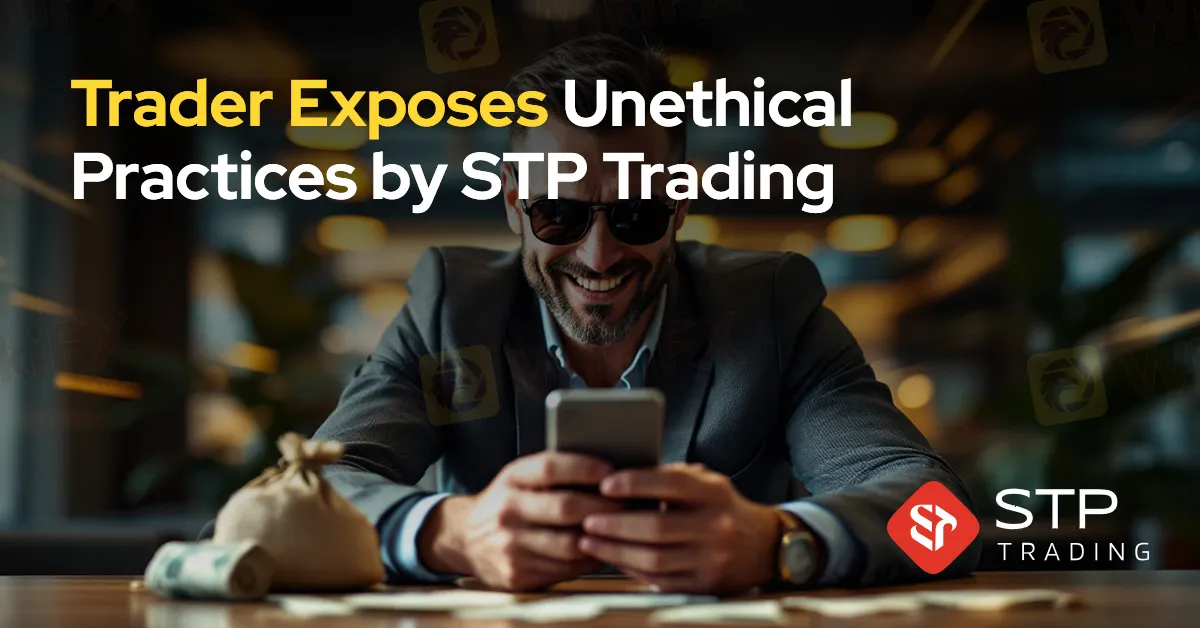简体中文
繁體中文
English
Pусский
日本語
ภาษาไทย
Tiếng Việt
Bahasa Indonesia
Español
हिन्दी
Filippiiniläinen
Français
Deutsch
Português
Türkçe
한국어
العربية
Trader Exposes Unethical Practices by STP Trading
Abstract:A recent allegation against STP Trading has cast doubt on the firm's business practices, highlighting the potential risks faced by retail traders in an increasingly crowded and competitive market.

In the high-stakes arena of online trading, trust and transparency form the foundation of any credible broker-client relationship. A recent allegation against STP Trading, a broker with a WikiScore of 5.70, has cast doubt on the firm's business practices, highlighting the potential risks faced by retail traders in an increasingly crowded and competitive market.
According to the complainant, Esmaeil, their ordeal began with a $1,005 deposit into an account with STP Trading. After opening a position on XAU/USD (gold) with a lot size of 0.6, the trader closed the trade with a profit of $454—a result they had every reason to celebrate. However, what transpired next proved to be anything but ordinary.


The trader alleges that STP Trading abruptly closed their account without prior notice or explanation. Despite multiple attempts to retrieve the full amount due—including their initial capital and the profit earned—they claim to have received only $949, falling significantly short of their expectations.
The brokers actions raise critical concerns about transparency and client protection. Abrupt account closures without clear justification and partial fund returns not only undermine the principles of fair trading but also erode confidence in the broker's operational integrity. For retail traders, whose financial stability often hinges on timely access to their capital and earnings, such incidents are particularly damaging.

STP Tradings WikiScore of 5.70, as rated by the regulatory query platform WikiFX, reflects a performance that falls below industry benchmarks. WikiFX recommends a minimum score of 7.0 for traders seeking reliable and transparent brokerage services. Scores below this threshold, while not necessarily indicative of outright fraud, often point to operational inconsistencies or a lack of regulatory oversight—factors that can leave traders vulnerable to disputes and financial losses.
The implications of such incidents extend far beyond individual cases. Unresolved grievances and questionable practices tarnish the reputation of the trading industry as a whole, discouraging participation and diminishing trust in online trading platforms. Brokers must recognise that their long-term viability depends on maintaining transparent operations and prioritising customer satisfaction.

For traders, this case underscores the importance of rigorous due diligence when selecting a broker. Regulatory credentials, client reviews, and independent ratings on platforms such as WikiFX should serve as essential checkpoints in the decision-making process. Choosing a broker solely based on promises of high returns or appealing marketing campaigns is a gamble that can lead to significant financial and emotional setbacks.
STP Trading has yet to address the allegations or provide clarification regarding the traders claims. Until such a response is forthcoming, the case remains a stark reminder of the potential pitfalls in online trading.

Disclaimer:
The views in this article only represent the author's personal views, and do not constitute investment advice on this platform. This platform does not guarantee the accuracy, completeness and timeliness of the information in the article, and will not be liable for any loss caused by the use of or reliance on the information in the article.
Read more

Are Trading Courses and Mentors a Fast Track or a Financial Trap?
In recent years, trading has become more popular than ever. Social media is full of people showing off their “trading lifestyle” with expensive cars, luxury holidays, and promises of easy money. Many of them claim to be mentors, investment coaches, or run online trading academies. They say they can turn beginners into full-time traders in just a few weeks. But is it true, or is it just a clever scam?

Using Any of These Illegal Forex Trading Apps? Stop Before It Turns into a Crisis
The Reserve Bank of India (RBI) has listed out some illegal forex apps India. Read this article to know some of those apps.

IC Markets Sponsors AEL Limassol, Football Club Until 2027
AEL Limassol has renewed its deal with IC Markets (EU) Ltd, who will stay as the team’s Gold Sponsor until 2027. The sponsorship deal was first announced for the 2025–2026 season, but it has now been officially extended until 2027.

5 Reasons to Stay Away from Core Prime Markets
The Forex market is a very unpredictable, complex, and risky place. There are many brokers that appear genuine but can steal your hard-earned money. So, staying alert is the only way to survive in this dynamic environment. Therefore, in this article, we are sharing 5 warning signs about Core Prime Markets.
WikiFX Broker
Latest News
PU Prime and AFA Announce Partnership at Madrid Event
ASIC Warns of Escalating Share Sale Scams Amid $119M Scam Losses
A Guide to RBI Forex Rules in India
“Wins with $19,916 weekly profit on Exnova”? There is something you should know.
Oil Prices Slide After Cease-Fire
IQ Option: Regulation, Warnings, and What Traders Need to Know
How Macro Events Drive Energy Price Fluctuations and Their Linked Impact on the Global Forex Market
Clones of ThinkMarkets Are Lurking | Don’t Fall for the Fake
Top 5 Forex Brokers Offering Islamic Accounts in 2025
Family offices double down on private credit and infrastructure during private equity slump, survey finds
Currency Calculator


